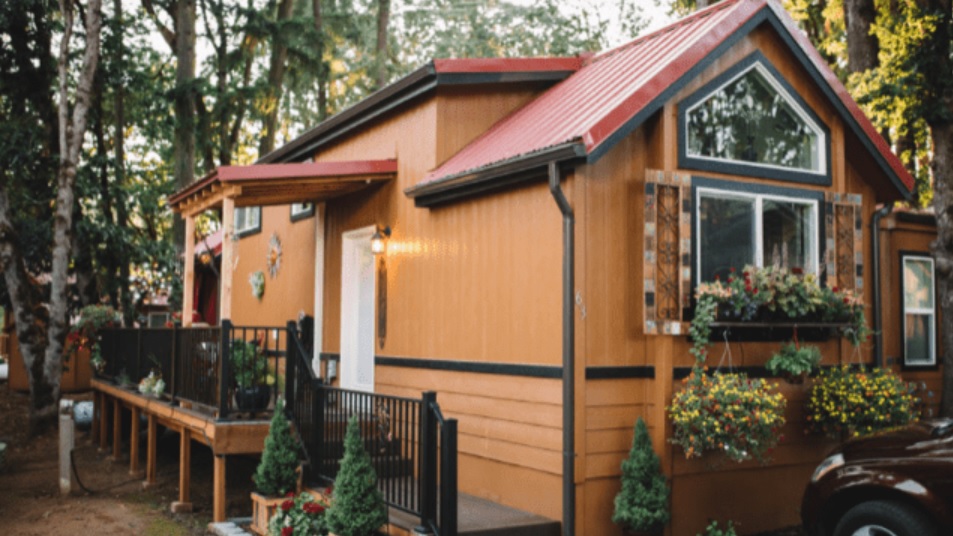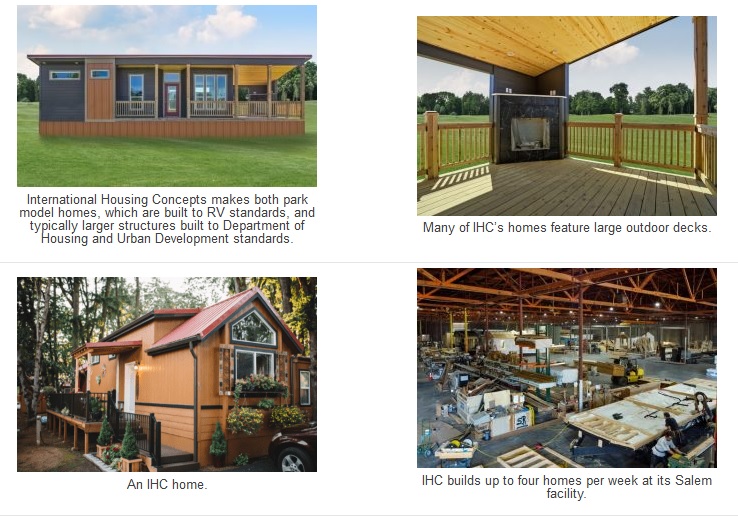
By Oregon Business and Industry
International Housing Concepts has turned the “tiny house” concept into a rapidly growing business that produces as many as four homes per week from its Salem manufacturing facility. It serves both high-end and affordable markets, employs more than 60 people in downtown Salem, and its diverse workforce features both skilled labor and people new to construction. In addition to training employees who are looking for a second chance, the company works closely with employment firms to help the homeless and those who are returning to the workforce.
International Housing Concepts is a premier manufacturer of park model homes. Park models are typically designed and built to RV industry standards. They are roughly 400 square feet in interior size and come in a variety of floorplans, including models with lofts and large exterior decks, says CEO Scott DeBo. The company offers more than a dozen park models in two series, the high-end Grand Teton Series and more affordable Sierra Series.
The company has begun building homes that meet the standards dictated the federal Department of Housing and Urban Development. HUD homes are towed to their locations, then set on traditional foundations. They become real property and are eligible for traditional home financing, says DeBo.
HUD units typically cost between $90,000 to $120,000, depending upon finish packages and size. Units can be built up to 950 square feet. These designs also have been attractive for use as accessory dwelling units (ADUs), which homeowners in a growing number of places can install on their properties, generating income and adding to the local stock of affordable housing.
The company’s product mix allows it to sell to several markets. One includes operators of traditional RV parks, which install small homes on plots leased to residents. This model preserves affordable housing options in expensive places like Oregon. Through retailers with which it contracts, International Housing Concepts also supplies a growing market for ADUs. In fact, it is focusing heavily on growth in three states – Oregon, Washington and California – that encourage the installation of ADUs as a way of addressing high housing costs. Additionally, the company serves developers of tiny-home neighborhoods.
IHC is planning a manufacturing facility in Phoenix, Ariz., a location driven by the cost of transportation, more out-of-market clients, and an expanding backlog, says DeBo. Premanufactured homes become less cost-competitive as the distance between the manufacturing facility and the final destination grows.
The company plans to continue manufacturing homes in Salem. “It is a great opportunity for both experienced journeymen, and those entering the construction trade,” says DeBo. “Crews work indoors, the work is stable and we are proud of our commitment to hiring a diverse workforce.” Employees can specialize and become skilled in a specific construction trade. One group frames, another attaches siding, and another still installs trusses, says DeBo. It’s far easier to teach an employee a small number of specialized skills than it is to teach them to do everything. And they can diversity and learn new skills over time.
“We’re adding value to our community,” says DeBo. “We believe our plant is adding to the economy of downtown Salem and providing stable, good paying jobs in Marion County.”
Disclaimer: Articles featured on Oregon Report are the creation, responsibility and opinion of the authoring individual or organization which is featured at the top of every article.


